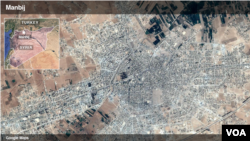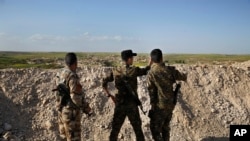The Turkish and U.S. presidents spoke by telephone Friday, as Ankara threatens to attack a key Washington ally in the U.S. effort against Islamic State in Syria.
The White House said U.S. President Donald Trump and Turkish President Recep Tayyip Erdogan discussed the "security concerns" of the two countries in Syria and the fight against terrorism.
"The presidents agreed to continue coordinating to achieve our respective security objectives in Syria," a White House statement said.
Turkish officials said the two leaders "agreed on the need for more effective coordination within the context of Syria.”
The conversation came as Turkish forces continued a buildup on the Syria border. Erdogan on Wednesday said a military operation would be launched in a “few days” against the Syrian YPG Kurdish militia.
Ankara considers the YPG a terrorist organization affiliated with the PKK rebel group that has been fighting a decades-long insurgency inside Turkey. The YPG, however, is a crucial ally in Washington’s war against Islamic State in Syria.
On Friday, Erdogan further ratcheted up tensions, targeting the Syrian City of Manbij.
"Manbij is a place 85-90 percent populated by Arabs, but they [the U.S.) have completely given it to a terrorist organization. They said we're going to eject them. They did not. If you don't, we will enter Manbij," Erdogan said in a speech to an Istanbul meeting of the Organization of Islamic Cooperation.
The YPG, as part of the SDF coalition, seized the Syrian city from Islamic State. Ankara accuses Washington of reneging on its commitment for the militia to withdraw.
Earlier this year, Ankara and Washington agreed to a road map to defuse tensions over Manbij. Part of the deal is already in effect with joint U.S.-Turkish military patrols outside Manbij.
Erdogan, however, accused Washington of deliberately delaying the critical part of the road map, the YPG’s withdrawal.
Turkish forces, along with its Arab militia allies, are close to Manbij. The U.S. Defense Department, in a statement Thursday, said any unilateral action against the YPG would be" unacceptable."
Erdogan said Wednesday Turkish forces would remove the militia's presence from hundreds of kilometers of Syrian territory bordering Turkey.
Local media report Turkish forces are continuing to reinforce an already large military presence on the Syrian border, facing off against the YPG.
The Turkish military buildup comes as the YPG engages in heavy fighting against Islamic State on the Syria-Iraq border. On Friday, the YPG claimed to have captured the town of Hajin, one of the last strongholds of the jihadist group.
The YPG commander, Mazloum Kobani, in comments to the news agency Reuters, warned that any attack by Turkish forces would impact the war against Islamic State.
“If there is a Turkish attack, the YPG forces will be forced to come to protect the borders, to defend their families,” Kobani said. Without them, “The battle against Daesh is not possible,” he added, using an Arab acronym for Islamic State.
Earlier this year, the YPG briefly suspended military operations in response to heavy shelling by Turkish artillery. In a bid to defuse tensions, Washington deployed three observation bases between the militia and the Turkish frontier.
Analysts say Turkey is calculating that, with Islamic State all but defeated in Syria, Washington is unlikely to risk a confrontation with Ankara over the YPG.
“I understand the assumption of President Erdogan that they can overcome these political difficulties,” said former senior Turkish diplomat Aydin Selcen, adding, “Or it will not break out of control to a full conflict level, but with some protests or whatever, then it will be business as usual with the U.S.”
US-Turkey relations
U.S.-Turkey relations are still recovering following October’s release by a Turkish court of American pastor Andrew Brunson. Brunson’s
detention resulted in the Trump administration imposing financial sanctions on Ankara, triggering a collapse in the Turkish lira, the effects of which continue.
“The Brunson affair showed dollar-TL (Turkish lira) peaked at 7.3. We were inches away from a balance of crisis - our banks couldn’t roll over maturing loans for a month,” said analyst Atilla Yesilada of Global Source Partners.
“And the economy's so fragile that any event could deal a lethal blow. We can no longer afford these ideological disputes with the West,” Yesilada added.
The Turkish currency has recovered from record lows, but, the fear of a new crisis between Ankara and Washington has seen some weakness in the lira this past week.
Heavier currency declines were averted, analysts suggest, by the belief that ultimately Ankara will avoid a confrontation with Washington.
“We are capable of acting against this terrorist corridor [referring to YPG), but dialogue (between Ankara and Washington) is ongoing. You have to negotiate and show your strength at the same time,” said an unnamed senior Turkish official quoted in an article by regional analyst Kyle Orton for Turkey’s state broadcaster TRT.
Observers suggest Erdogan could be looking for Washington to expedite the removal of the YPG from Manbij and the creation of a security cordon inside Syria along Turkey’s border.
VOA White House correspondent Steve Herman contributed to this report.






